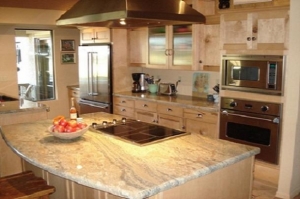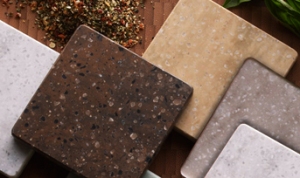Kitchen Counter Top Choices
Granite is the most common choice among high-end kitchens and is available in a variety of shades such as blacks, whites, greens, corals and beiges, and no two pieces are exactly the same. Granite is available in two finishes.

Pros: very hard; holds up to heat; comes in a wide range of colors; looks permanent and substantial; new sealers are easy to apply; has a high value to home buyers
Cons: porous and needs to be sealed; hardness makes it easier to break dishware and glasses
Natural Stones (Marble, Limestone, Soapstone) are softer than granite and require delicate use and greater care. They are becoming more and more common in high-end homes around Atlanta.

Pros: timeless natural beauty; resistant to heat; no two stone counters look the same
Cons: can scratch or chip; can stain more easily than granite by food acids; need to be sealed annually
Wood countertops, like butcher block, instantly warm up a kitchen. Hardwoods such as maple and oak are most often used as countertop woods.

Pros: easy to clean; smooth; can be sanded and resealed as needed, will not hurt knives.
Cons: needs oiling, can be damaged by water and stains over time, can absorb food odors
Engineered Stone is composed of 93% quartz particles, pebbles, polymers, and epoxy. It is available in a larger range of colors than granite and has a nonporous surface that resists scratches. It's easy to maintain, without the annual sealing required by natural stone. Some brands on the market include DuPont Zodiaq®, LG Viatera®, Cambria Quartz, and Silestone®.

Pros: Resistant to stain and acid; resistant to heat; easy care
Cons: Less natural looking than the real thing (such as granite and marble)
Solid Surfaces are most often referred to by well know manufacturers such as: Corian, Avonite, Staron, Gibraltar, and Earthstone. Solid surfaces are all man-made material, top to bottom. Unlike laminate, there are no layers. Solid surfaces are not cheap, but they are a good middle range choice both in terms on price and aesthetic value.

Pros: come in countless colors; stain resistant; if you scratch or gouge the surface, you can sand it out with very fine sandpaper
Cons: very hot pans can damage (crack or scorch) solid surfaces
Stainless Steel has come out of professional kitchens and into the home. 16 gauge stainless steel is often used in home kitchens, whereas the thicker 14 gauge and 12 gauge stainless steel is found in restaurant kitchens. It has a sleek, contemporary look.

Pros: because it starts as raw material, it can be formed into practically any shape and dimension you desire; impervious to acids and oils
Cons: Very expensive; can scratch easily, can require a lot of maintenance to keep it looking new
Concrete countertops, which can be completely customized with pigments, are gaining popularity. Concrete is available in several different finishes: trowel (smooth), ground (sanded to expose the sand aggregate) and pressed (a tool is used to reveal marble-like veining).

Pros: trendy, very-customized with lots of finish options; fairly heat resistant
Cons: very porous - damp sponges left on the counter can cause discoloration and acidic spills may etch the surface, also needs occasional waxing to prevent stains; extreme or abrupt changes in temperature may cause concrete to warp or curl
Laminate is the most affordable countertop material on the market and comes in an array of colors and designs. Laminate counters bear trademarks such as Formica, Nevamar, and Wilsonart. They're made of plastic-coated synthetics with a smooth surface that's easy to clean. The pieces are cut to size and finished on the ends.

Pros: you can buy laminates in lots of colors; easy to maintain; durable; inexpensive
Cons: scratches and chips are almost impossible to repair; can scorch if a hot pad touches the surface; seams show
Ceramic tile is the only countertop project that could remotely be called a do-it-yourself project, as all of the other surfaces require special tools and special skills. Still, installing ceramic tile on a countertop is not simple. This is a highly visible surface and any errors or mistakes will stand out.

Pros: cost (can be even cheaper than laminate); infinite range of design possibilities
Cons: grout – the grout continually gets food and crumbs stuck in the grooves and is difficult to clean. The grout also needs to be sealed.
To learn more about our company, please visit www.haskcustomhomes.com
To return back, please click here: Hask Custom Homes - Articles
- Polished finish results in a shiny look and often darkens the appearance of the stone,
- Honed finish which is soft and matte.

Pros: very hard; holds up to heat; comes in a wide range of colors; looks permanent and substantial; new sealers are easy to apply; has a high value to home buyers
Cons: porous and needs to be sealed; hardness makes it easier to break dishware and glasses
Natural Stones (Marble, Limestone, Soapstone) are softer than granite and require delicate use and greater care. They are becoming more and more common in high-end homes around Atlanta.

Pros: timeless natural beauty; resistant to heat; no two stone counters look the same
Cons: can scratch or chip; can stain more easily than granite by food acids; need to be sealed annually
Wood countertops, like butcher block, instantly warm up a kitchen. Hardwoods such as maple and oak are most often used as countertop woods.

Pros: easy to clean; smooth; can be sanded and resealed as needed, will not hurt knives.
Cons: needs oiling, can be damaged by water and stains over time, can absorb food odors
Engineered Stone is composed of 93% quartz particles, pebbles, polymers, and epoxy. It is available in a larger range of colors than granite and has a nonporous surface that resists scratches. It's easy to maintain, without the annual sealing required by natural stone. Some brands on the market include DuPont Zodiaq®, LG Viatera®, Cambria Quartz, and Silestone®.

Pros: Resistant to stain and acid; resistant to heat; easy care
Cons: Less natural looking than the real thing (such as granite and marble)
Solid Surfaces are most often referred to by well know manufacturers such as: Corian, Avonite, Staron, Gibraltar, and Earthstone. Solid surfaces are all man-made material, top to bottom. Unlike laminate, there are no layers. Solid surfaces are not cheap, but they are a good middle range choice both in terms on price and aesthetic value.

Pros: come in countless colors; stain resistant; if you scratch or gouge the surface, you can sand it out with very fine sandpaper
Cons: very hot pans can damage (crack or scorch) solid surfaces
Stainless Steel has come out of professional kitchens and into the home. 16 gauge stainless steel is often used in home kitchens, whereas the thicker 14 gauge and 12 gauge stainless steel is found in restaurant kitchens. It has a sleek, contemporary look.

Pros: because it starts as raw material, it can be formed into practically any shape and dimension you desire; impervious to acids and oils
Cons: Very expensive; can scratch easily, can require a lot of maintenance to keep it looking new
Concrete countertops, which can be completely customized with pigments, are gaining popularity. Concrete is available in several different finishes: trowel (smooth), ground (sanded to expose the sand aggregate) and pressed (a tool is used to reveal marble-like veining).

Pros: trendy, very-customized with lots of finish options; fairly heat resistant
Cons: very porous - damp sponges left on the counter can cause discoloration and acidic spills may etch the surface, also needs occasional waxing to prevent stains; extreme or abrupt changes in temperature may cause concrete to warp or curl
Laminate is the most affordable countertop material on the market and comes in an array of colors and designs. Laminate counters bear trademarks such as Formica, Nevamar, and Wilsonart. They're made of plastic-coated synthetics with a smooth surface that's easy to clean. The pieces are cut to size and finished on the ends.

Pros: you can buy laminates in lots of colors; easy to maintain; durable; inexpensive
Cons: scratches and chips are almost impossible to repair; can scorch if a hot pad touches the surface; seams show
Ceramic tile is the only countertop project that could remotely be called a do-it-yourself project, as all of the other surfaces require special tools and special skills. Still, installing ceramic tile on a countertop is not simple. This is a highly visible surface and any errors or mistakes will stand out.

Pros: cost (can be even cheaper than laminate); infinite range of design possibilities
Cons: grout – the grout continually gets food and crumbs stuck in the grooves and is difficult to clean. The grout also needs to be sealed.
To learn more about our company, please visit www.haskcustomhomes.com
To return back, please click here: Hask Custom Homes - Articles
What is your experience with sinks? There are so many new types.
ReplyDeleteStainless steel is probably still the most common and always a good selection. Cast iron and porcelain are also very popular, especially with the farmhouse style sinks.
DeleteGranite sinks tend to be too hard and easily break china and glasses. Copper looks good at first, but can turn colors in irregular forms with detergents, etc. Both of these are difficult to maintain the initial attractiveness.